|
Books Should Be Free Loyal Books Free Public Domain Audiobooks & eBook Downloads |
|
|
Books Should Be Free Loyal Books Free Public Domain Audiobooks & eBook Downloads |
|
Fiction |
|---|
|
Book type:
Sort by:
View by:
|
By: Joseph Smith Fletcher (1863-1935) | |
|---|---|
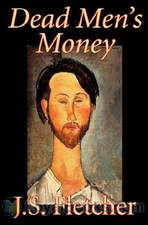 Dead Men's Money
Dead Men's Money
A naïve but sincere young lawyer's assistant who only dreams of marrying his childhood sweetheart and yearns to have a home and family with her. His sharp witted boss keeps the firm going by dint of shrewd business sense and legal talent. When the assistant accidentally stumbles into a murder case, the scene is set for events that change all their lives. Dead Men's Money by Joseph Smith Fletcher was published in 1920, the era considered to be the Golden Age of detective fiction. Writers like Agatha Christie, Ngaio Marsh, Dorothy L... | |
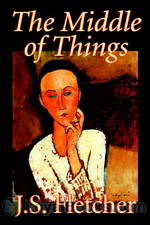 The Middle of Things
The Middle of Things
If you're in the mood for a cracking good classic murder mystery, The Middle of Things by JS Fletcher will certainly come up to expectations! Richard Viner is your average man on the street who stumbles upon a dead body in a dimly lit alley while taking his usual nightly stroll. When the police arrive, they conclude that this is a case of a robbery gone wrong, as the dead man's valuables are missing. However, as the case progresses, Viner discovers to his consternation, that the prime accused in the case is an old school-mate who is caught pawning items of jewelry belonging to the dead man... | |
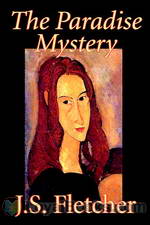 The Paradise Mystery
The Paradise Mystery
A quiet cathedral town in England, full of gossips and people who are not quite who they seem to be, is the setting for this murder mystery. | |
 The Chestermarke Instinct
The Chestermarke Instinct
Bank manager John Hornbury is missing, as are securities and jewels from the bank’s vault. Gabriel Chestermarke and his nephew Joseph have unaccountably refused to call in the police to investigate the theft from their bank. When Betty Fosdyke shows up to visit her Uncle John, she finds it past belief that he would simply disappear – let alone that he would commit larceny. Unable to simply sit by and wait while a detective from Scotland Yard investigates, Betty elicits the help of the chief clerk at Chestermarke’s bank and launches into the middle of the mystery. | |
By: Marion Zimmer Bradley | |
|---|---|
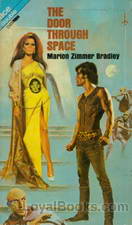 The Door Through Space
The Door Through Space
At one time Race Cargill had been the best Terran Intelligence agent on the complex and mysterious planet of Wolf. He had repeatedly imperiled his life amongst the half-human and non-human creatures of the sullen world. And he had repeatedly accomplished the fantastic missions until his name was emblazoned with glory. But that had all seemingly ended. For six long years he’d sat behind a boring desk inside the fenced-in Terran Headquarters, cut off there ever since he and a rival had scarred and ripped each other in blood-feud... | |
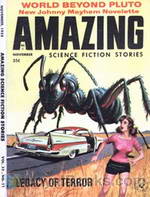 The Planet Savers
The Planet Savers
The Terran colony on the planet Darkover faces imminent destruction by a plague of the deadly Trailmen's Fever. The only hope is to develop a serum in time, but this requires the cooperation of the elusive native Trailmen, the brilliant parasitologist Dr. Jay Allison, and his split personality. (Introduction by Mark Nelson) | |
By: H. Beam Piper (1904-1964) | |
|---|---|
 Five Sci-Fi Short Stories by H. Beam Piper
Five Sci-Fi Short Stories by H. Beam Piper
Henry Beam Piper’s book “Five Sci-Fi Short Stories“ is a collection of: The Answer, Temple Trouble, Flight From Tomorrow, Police Operation and Graveyard of Dreams. “The Answer” is about two nuclear scientists who have successfully made a very powerful weapon and are planning to drop it from space on un-expecting earthlings. The story is set in 1984, many years after a supposed nuclear war between the US and the Soviet Union had ended. The stories "Temple Trouble" and "Police Operation" deal with alternate histories which is a theme that Piper is well known for... | |
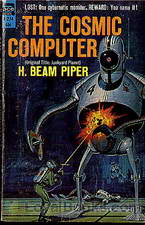 The Cosmic Computer
The Cosmic Computer
Conn Maxwell returns from Terra to his poverty-stricken home planet of Poictesme, “The Junkyard Planet”, with news of the possible location of Merlin, a military super-computer rumored to have been abandoned there after the last war. The inhabitants hope to find Merlin, which they think will be their ticket to wealth and prosperity. But is Merlin real, or just an old rumor? And if they find it will it save them, or tear them apart? | |
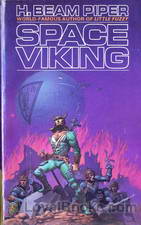 Space Viking
Space Viking
A galactic war has left the Terran Federation in ruins. Formerly civilized planets have decivilized into barbarism. Space Vikings roam the wreckage, plundering and killing for gain. Lord Lucas Trask of Traskon was no admirer of the Space Vikings, but when murder takes his wife on his wedding day, Trask trades everything he has for his own Space Viking ship and sets out on a galaxy-wide quest for revenge. | |
 Murder in the Gunroom
Murder in the Gunroom
The Lane Fleming collection of early pistols and revolvers was one of the best in the country. When Fleming was found dead on the floor of his locked gunroom, a Confederate-made Colt-type percussion .36 revolver in his hand, the coroner’s verdict was “death by accident.” But Gladys Fleming had her doubts. Enough at any rate to engage Colonel Jefferson Davis Rand—better known just as Jeff—private detective and a pistol-collector himself, to catalogue, appraise, and negotiate the sale of her late husband’s collection. | |
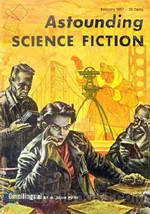 Omnilingual
Omnilingual
An expedition to Mars discovers the remains of an advanced civilization, which died out many thousands of years ago. They recovered books and documents left behind, and are puzzled by their contents. Would the team find their “Rosetta Stone” that would allow them to unlock the Martian language, and learn the secrets of this long-dead race? | |
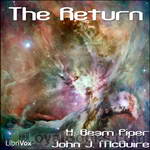 The Return
The Return
Two-hundred years after a global nuclear war, two explorers from a research outpost, that largely survived the cataclysm, discover a settlement of humans who have managed to maintain their civilisation despite ferocious cannibal neighbours, the Scowrers. However, the explorers must turn detective in order to understand the mystery of their hosts philosophy and religion. (Description by Reynard) | |
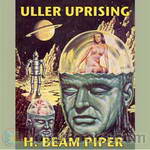 Uller Uprising
Uller Uprising
Uller Uprising is the story of a confrontation between a human overlord and alien servants, with an ironic twist at the end. Like most of Piper’s best work, Uller Uprising is modeled after an actual event in human history; in this case the Sepoy Mutiny (a Bengal uprising in British-held India brought about when rumors were spread to native soldiers that cartridges being issued by the British were coated with animal fat. The rebellion quickly spread throughout India and led to the massacre of the British Colony at Cawnpore.). Piper’s novel is not a mere retelling of the Indian Mutiny, but rather an analysis of an historical event applied to a similar situation in the far future. | |
 Four-Day Planet
Four-Day Planet
Fenris isn't a hell planet, but it's nobody's bargain. With 2,000-hour days and an 8,000-hour year, it alternates blazing heat with killing cold. A planet like that tends to breed a special kind of person: tough enough to stay alive and smart enough to make the best of it. When that kind of person discovers he's being cheated of wealth he's risked his life for, that kind of planet is ripe for revolution. (Introduction from the Gutenberg text) | |
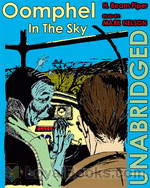 Oomphel in the Sky
Oomphel in the Sky
Natives of the distant planet of Kwannon believe that their world is about to end, and in preparing for the apocalypse, may be unnecessarily bringing about their own demise. The planetary government can’t overcome its own bureaucracy to help them, and the military is overwhelmed. Can a single newsman change the course of a whole people, and save their world? | |
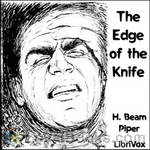 The Edge of the Knife
The Edge of the Knife
The Terro-Human Future History is Piper’s detailed account of the next 6000 years of human history. 1942, the year the first fission reactor was constructed, is defined as the year 1 A.E. (Atomic Era). In 1973, a nuclear war devastates the planet, eventually laying the groundwork for the emergence of a Terran Federation, once humanity goes into space and develops antigravity technology.The story “The Edge of the Knife” (collected in Empire) occurs slightly before the war, and involves a man who sees flashes of the future. It links many key elements of Piper’s series. | |
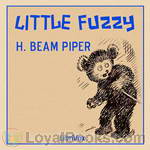 Little Fuzzy
Little Fuzzy
Jack Holloway, a prospector on the planet Zarathustra discovers small furry creatures. These creatures are obviously intelligent, but are they animals or are they sapient? If they are sapient the planet will be declared a protected zone and the company that is developing the planet commercially will lose their exclusive rights to the resources… | |
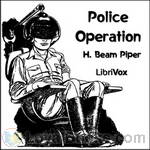 Police Operation
Police Operation
H. Beam Piper (1904–1964) was an American science fiction author. He wrote many short stories and several novels. He is best known for his extensive Terro-Human Future History series of stories and a shorter series of “Paratime” alternate history tales. | |
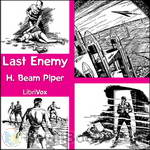 Last Enemy
Last Enemy
An undercover Paratimer has disappeared on assignment while in an alternate time line, and it’s up to Verkan Vall of the Paratime Police to save her. To do so, he must infiltrate a universe in which assassination is an honorable profession, and reincarnation a scientific fact. Will Verkan Vall survive in a world of killers and the undead? | |
 Null-ABC
Null-ABC
"There's some reaction these days that holds scientists responsible for war. Take it one step further: What happens if "book-learnin'" is held responsible ...?" | |
 Temple Trouble
Temple Trouble
I'll bet you did not know that our little earth is not limited to the single time line on which we happen to exist. That's right; There are actually thousands, no many millions of parallel times, each existing alongside all the rest, using the same real estate, but following their own path. Some extremely primitive, some very advanced, but all blissfully unaware of the others. Of course this does not affect us at all, unless ... unless one of these time lines discovers the existence of the others and then a way to move easily back and forth from one to the other... | |
 Naudsonce
Naudsonce
Naudsonce? What does THAT mean? Well, to find out you will need to listen to this story where Piper's unique mind explores what we mean by 'communication' and how it happens. The joint Space Navy-Colonial Office expedition was looking for new planets suitable for colonization; they had been out, now, for four years, which was close to maximum for an exploring expedition. They had entered eleven systems, and made landings on eight planets. Three had been reasonably close to Terra-type but were all disqualified by terrible animals or warlike inhabitants... | |
By: Alexander Hamilton (1755/1757-1804) | |
|---|---|
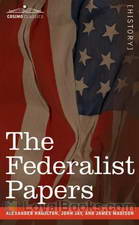 The Federalist Papers
The Federalist Papers
In order to promote the ratification of the United States Constitution in the late 1780s, Alexander Hamilton, James Madison and John Hay wrote a series of 85 articles and essays explaining their reasons to support the constitution. Most of these articles were published in The Independent Journal and The New York Packet and they later became known as “The Federalist Papers.” In reading the articles, one will encounter very interesting issues like Hamilton’s opposition to including the Bill of Rights in the Constitution and why he thinks a Union is better than a Confederation... | |
By: Arnold Bennett (1867-1931) | |
|---|---|
 The Card
The Card
The ‘Card’ in question is Edward Henry Machin – his mother called him ‘Denry.’This light-hearted story is of his rise from humble beginnings as the son of a washerwoman and sempstress in the last quarter of the nineteenth century, in the pottery towns (which Arnold Bennett christened ‘The Five Towns’) of the English Midlands; how, by his own wits, enterprise and ‘nerve’ he rose to wealth, married bliss and public recognition as the youngest-ever mayor of his home town. “’And yet,’ demanded Councillor Barlow, ‘what’s he done? What great cause is he identified with?’‘He’s identified,’ said the speaker, ‘with the great cause of cheering us all up’.” | |
 The Price of Love
The Price of Love
Rachel Louise Fleckring works for the elderly Mrs Maldon, and although with the woman for only a short time, she is taken into the heart of the family. She falls in love with one of Mrs Maldon’s descendents, but along the way, she has to come to terms with the fact that he isn’t, perhaps, the perfectly honest man she thought he was. | |
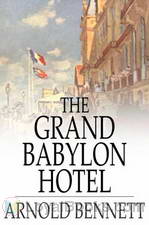 The Grand Babylon Hotel
The Grand Babylon Hotel
Theodore Racksole, a rich American multi-millionaire, buys the Grand Babylon Hotel, a luxurious hotel in London, as a whim – and then finds out there are strange things going on – a German prince is supposed to arrive but never turns up, someone is found murdered in the hotel, but then the body disappears. With the help of his independent daughter Nella and another German prince, Racksole sets out to solve the mystery.Bennett wrote this as a 15-part serial, for a lark, in 15 days, and sold it for 100 pounds. It first appeared in The Golden Penny in 1902, which described it as “the most original, amusing, and thrilling serial written in a decade”. | |
 The Old Wives' Tale
The Old Wives' Tale
The Old Wives’ Tale is a novel by Arnold Bennett, first published in 1908. It deals with the lives of two very different sisters, Constance and Sophia Baines, following their stories from their youth, working in their mother’s draper’s shop, into old age. It is generally regarded as one of Bennett’s finest works. It covers a period of about 70 years from roughly 1840 to 1905, and is set in Burslem and Paris. | |
 Literary Taste: How to Form It
Literary Taste: How to Form It
Arnold Bennett describes a method for enjoying literature, and suggests the contents of a comprehensive library. Chapters 1-10 and 14 describe his method for learning to enjoy literature. Chapters 11, 12, and 13 contain detailed lists of the 337 volumes required to complete a comprehensive library of English works. This reading is from the 1913 version at Project Gutenberg, and so does not contain the revisions made by Swinnerton for the 1939 edition, which included authors of the early Twentieth Century. Swinnerton’s revisions are available from Wikipedia. | |
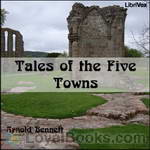 Tales of the Five Towns
Tales of the Five Towns
This is a selection of short stories recounting, with gentle satire and tolerant good humour, the small town provincial life at the end of the nineteenth century, based around the six towns in the county of Staffordshire, England, known as the Potteries. Arnold Bennett chose to fictionalize these towns by changing their names and omitting one (Fenton) as he apparently felt that “Five Towns” was more euphonious than “Six Towns”. The real town names which are thinly disguised in the novel are: Hanley, Longton, Burslem and Tunstal, the fifth, Stoke became “Knype”... | |
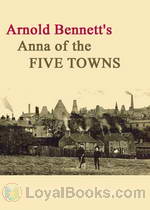 Anna of the Five Towns
Anna of the Five Towns
The plot centers on Anna Tellwright, daughter of a wealthy but miserly and dictatorial father, living in the Potteries area of Staffordshire, England. Her activities are strictly controlled by the Methodist church. Having escaped her father by marrying the respectable and attractive Henry, she attempts in vain to help Willy, son of a drunken and bankrupt business associate of her father's. | |
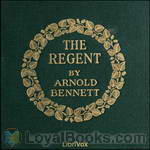 The Regent
The Regent
'The Regent' is, if not a sequel to 'The Card', then a 'Further Adventures of' the eponymous hero of that novel.Denry Machin is now forty-three and begins to feel that he is getting old, that making money and a happy home life are not enough and that he has lost his touch as the entrepreneur and entertainer of the 'Five Towns'.In fact, as he says to himself 'What I want is change - and a lot of it too!'. A chance meeting at the local theatre leads to his going to London and then... | |
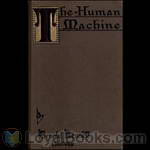 The Human Machine
The Human Machine
Bennett asks us to consider our brains as the most wonderful machine, a machine which is the only thing in this world that we can control. As he writes: "I am simply bent on calling your attention to a fact which has perhaps wholly or partially escaped you -- namely, that you are the most fascinating bit of machinery that ever was."As ever, his prose is honeyed, his thoughts inspired, and his advice as relevant today as when it was written. (Introduction by Ruth Golding) | |